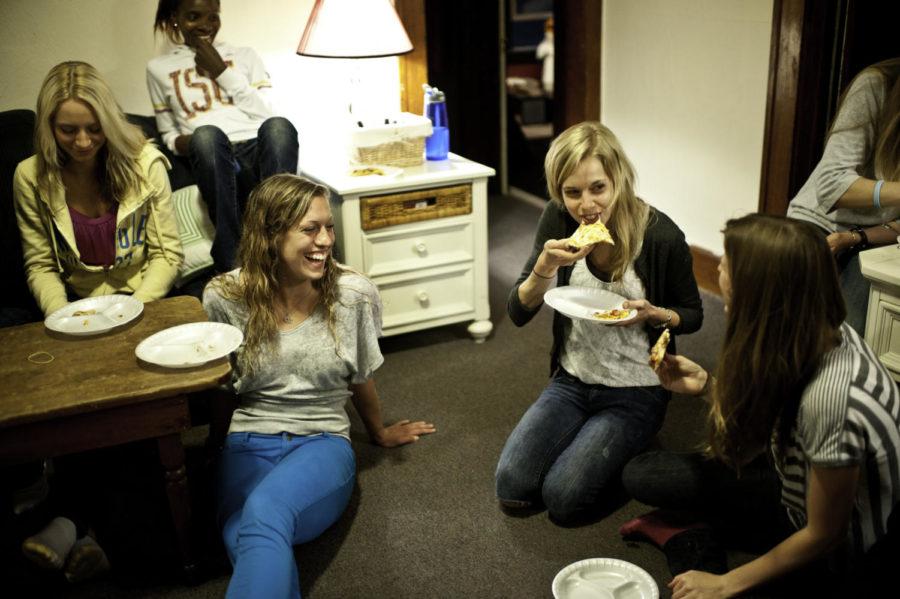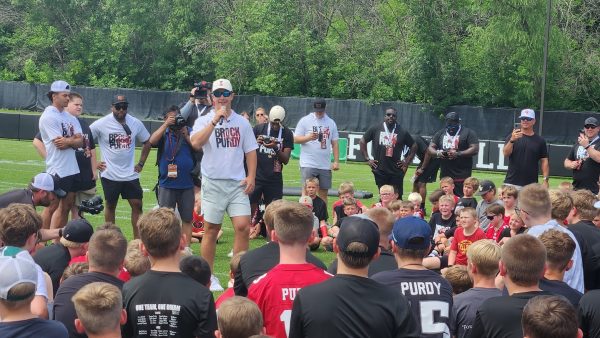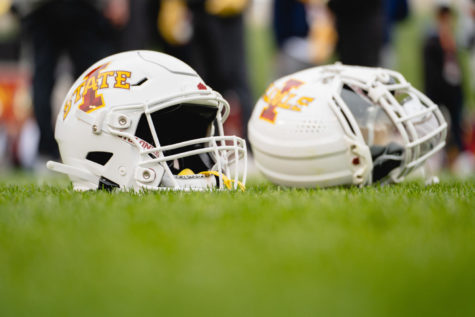Runner seeks equal nutrition for all
Photo: Yue Wu/Iowa State Daily
ISU distance track runner Madeline Becker, middle, hosts a pizza party with her track friends at her home on Friday, April 13.
April 16, 2012
Every time sophomore Maddy Becker crosses the finish line as a member of the ISU cross-country and track-and-field teams, she knows part of her success is due to proper nutrition.
“Nutrition is really important to be a good athlete,” Becker said. “You need to make sure you’re getting enough fuel and eating the right kinds of foods to help your body to recover.”
Growing up, Becker never went to bed hungry, but hunger pangs can be experienced every night for millions of Americans.
According to the Academy of Nutrition and Dietetics, 49 million people experienced food insecurity in America in 2008.
With majors in dietetics and political science, Becker wants to change legislative policies to make sure low-income families have access to nutritious food.
“It’s really unfortunate that there’s a perception in the U.S. that it’s really expensive to eat healthy,” Becker said. “I would like to make healthy eating more affordable to everyone.”
In working with Helen Jensen, ISU professor of economics, to see how to make government food-assistance programs healthier, Becker found that providing incentives to eat healthily is more effective than providing restrictions on unhealthy food.
“The research shows that people just use their other sources of income to buy unhealthy foods,” Becker said. “Whereas if you give them encouragement to eat fruits and vegetables, they’ll be more open to trying something new.”
As a dietetics major, Becker will take FSHN 361: Nutrition and Health Assessment — a class that assigns students to assess controversial policies about nutrition and debate them.
“One of the reasons [for the project] is to figure out, what is the rationale behind why we make these big changes in diet practices and recommendations in the country?” said Lorraine Lanningham-Foster, assistant professor of food science and human nutrition. “From my perspective as a nutritional scientist, what we’re trying to do is make sure people have adequate amounts of nutrients.”
Lanningham-Foster said a current debate is gauging the right amount of calories in school lunches.
Some people say they believe the high-calorie lunches are a reason for childhood obesity, while others say they believe school lunches are the only source of food for many low-income students and thus high-calorie lunches are needed.
Meagan Burnham, registered dietitian for the ISU athletic department and lecturer of food science and human nutrition, said it can be more difficult for high school students to consume nutritious foods because they’re not the ones buying groceries.
“They’re definitely at a disadvantage unless the parent knows exactly what nutrients are needed,” Burnham said.
Burnham said a lot of people think it’s cheaper and easier to just buy fast food.
“Actually, what you pay per meal at a fast-food restaurant is typically more expensive than something you could make comparably for yourself that would be healthier and at home,” Burnham said.
Burnham works with a lot of student-athletes to make healthy eating affordable. She said protein can be an expensive item, but there are inexpensive alternatives.
Instead of buying meat, Burnham recommends athletes try beans and wild rice, which are cheaper and still qualify as complete proteins.
Burnham said it’s also important to educate coaches and parents about proper nutrition.
If a high school student-athlete doesn’t get proper nutrition, it could lead to poor performance in school and athletics. If their performance slumps too much, it’s possible they could lose their chance to earn a college scholarship.
As a result, many low-income students could see their college dreams disappear without a scholarship.
Becker also agrees that education is key.
“I think doing preventative care by having people eat a nutritious diet could prevent a lot of the cost of health care later on,” Becker said.
Jensen said food polices are complex and that the key is to find mechanisms that work and are cost-effective. She said she thinks education is the best way to do this.
“If you want people to eat more broccoli, you can work on producers to make more and put more on the market, or you can work on consumers to want more broccoli,” Jensen said. “It’s probably going to be more effective to work on consumers.”
Becker said she finds the work she does with policy change fun, but wants to do even more.
“I’d like to get more involved at the governmental level,” Becker said.
Becker will continue working with policy as an intern for former Iowa first lady Christie Vilsack, who is running for Congress in Iowa’s 4th District, this summer and is excited for the opportunity.

















